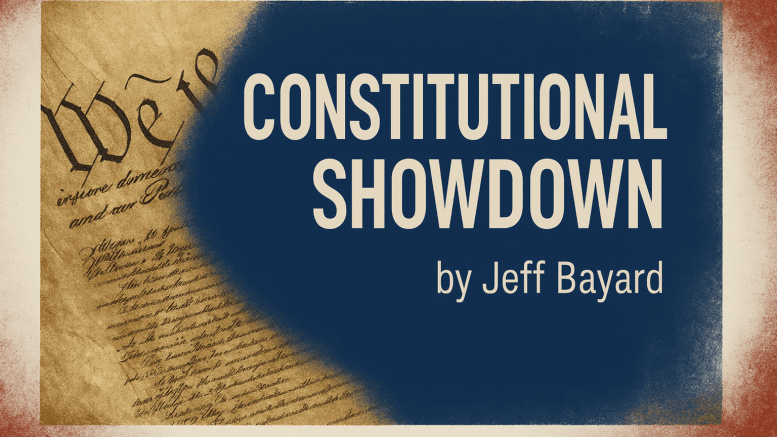For the Lord is our judge, the Lord is our lawgiver, the Lord is our king; he will save us.” – Isaiah 33:22
“A house divided against itself cannot stand.” – Abraham Lincoln
In the escalating tug-of-war between the executive branch under the scrutiny of Trump vs. The Courts and the federal judiciary, President Donald Trump once again finds his constitutional authority challenged in the courtroom. As key policy pillars—tariffs, immigration enforcement, and agency oversight—move through the legal system, a deeper question rises to the surface: Who rules America—the people’s elected president or unelected judges?
Trump vs. The Courts: Tariff Rulings and Judicial Resistance
On May 28, 2025, the U.S. Court of International Trade ruled that President Trump lacked the statutory authority under the International Emergency Economic Powers Act (IEEPA) to impose what are now called “Trafficking Tariffs.” These tariffs were aimed at pressuring trading partners to take stronger action against fentanyl trafficking and border-related threats.
The court found that Trump’s justification failed to show a direct link between the foreign threat and the economic measure. A day later, a D.C. judge issued a narrower ruling blocking tariff enforcement against two small businesses. But here’s the twist: both rulings are currently stayed on appeal. For now, the tariffs stand.
The deeper issue? While Article I, Section 8 gives Congress the power to regulate foreign commerce, presidents have historically acted through emergency powers like IEEPA. If courts now demand a direct and judicially approved link between threat and action, executive discretion becomes judicial permission—an inversion of our constitutional design. This legal clash is a central feature of Trump vs. The Courts.
Trump vs. The Courts: Alien Enemies or Political Targets?
In J.A.V. v. Trump, the administration invoked the Alien Enemies Act (AEA) to halt the entry and facilitate the removal of noncitizens from Venezuela, citing national security concerns. A federal judge blocked the order with a temporary restraining order, followed by a preliminary injunction.
The ruling requires the government to give three weeks’ notice and offer a hearing opportunity before any removals. Legal challenges are now multiplying, with class action suits forming in several jurisdictions.
The Alien Enemies Act, passed in 1798, was intended to give the president wartime discretion to act swiftly against foreign threats. Today’s rulings risk transforming that emergency tool into a courtroom debate, where unelected judges become the final gatekeepers of national defense. This judicial control underscores the ongoing battle of Trump vs. The Courts.
Trump vs. The Courts: SCOTUS Pushes Back on Nationwide Injunctions
In a pivotal 6–3 ruling (Trump v. CASA), the Supreme Court narrowed the power of lower courts to issue nationwide injunctions. The decision held that such sweeping relief should only be granted in certified class actions, not as a default tool of judicial opposition.
This is a procedural win for Trump and a potential rebalancing of power. But the order at issue, Trump’s executive action to end birthright citizenship, remains blocked under existing class-based injunctions. The Court avoided ruling on the substance of the policy itself.
While the decision reins in rogue lower courts, it does not yet settle whether a president can reverse a policy by executive order that was never legislatively enacted. At stake is the original meaning of the 14th Amendment—particularly whether ‘subject to the jurisdiction thereof’ was ever intended to guarantee automatic citizenship to the children of noncitizens.
Trump vs. The Courts: Bureaucracy Strikes Back
Separate rulings have limited Trump’s ability to reshape the administrative state. Courts have:
- Blocked attempts to dismiss entrenched civil servants
- Prevented the dissolution of the Consumer Financial Protection Bureau (CFPB)
- Restored internal watchdogs removed from executive agencies
Each case highlights how deeply the judiciary has entrenched itself as a shield for the permanent bureaucracy. What was once called “draining the swamp” is now rebranded in legal briefs as “unconstitutional interference.” This legal interference is another front in the Trump vs. the Courts confrontation.
Trump vs. The Courts: What’s Really at Stake?
The Constitution gives the president specific, enumerated powers—especially in foreign affairs, national security, and administration of federal law. Yet these cases reveal a trend: courts are no longer refereeing the game. They’re acting as shadow legislators and co-presidents.
Procedural rulings, such as the narrowing of nationwide injunctions, may prove beneficial in the long run. But for now, the executive’s ability to act is bogged down in legal quicksand.
What we are witnessing is not standard friction—it is constitutional sabotage.
A Biblical Call to Clarity in Trump vs. The Courts
God’s design for civil government is not chaotic or vague. “The Lord is our judge… lawgiver… king.” (Isaiah 33:22) Human government should reflect this orderly balance, with clear roles and righteous restraint.
When unelected judges undermine lawful executive actions in ways that appear to prioritize ideology over constitutional limits, they violate not only the Constitution—but the moral fabric of accountability under God.
We must not yield to judicial supremacy disguised as justice. This is a moment for clarity, courage, and spiritual vigilance.
Will we stand for the rule of law? Or will we accept rule by lawsuit?
🔗 Related:
Browse the full Constitutional Showdown series for more episodes in America’s legal war over truth, justice, and constitutional authority:


